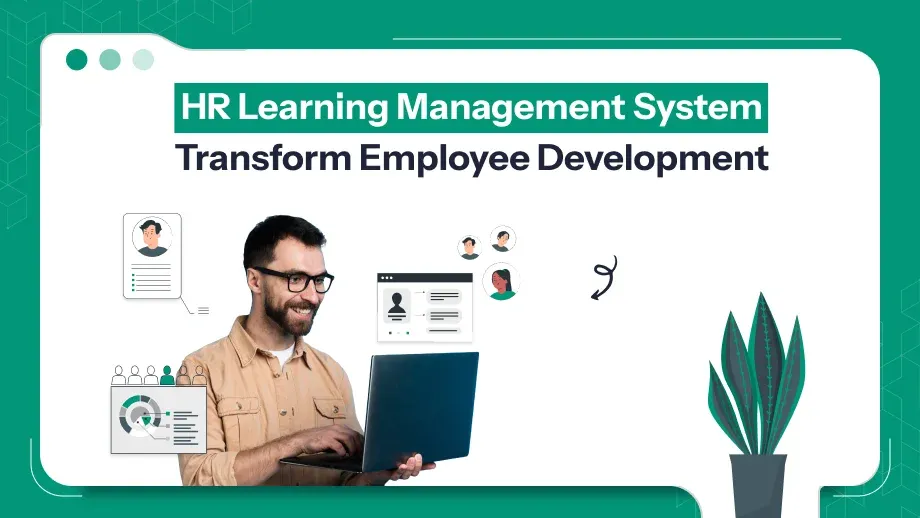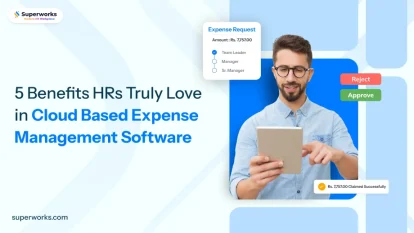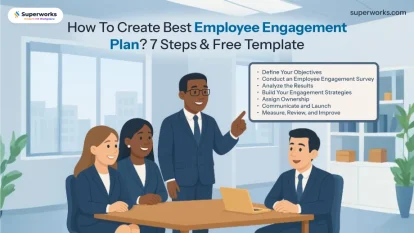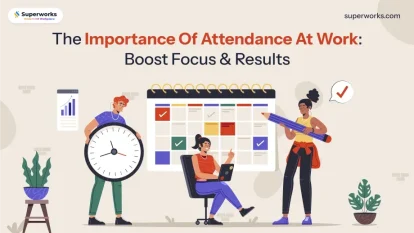
Continuous learning is becoming less of a possibility in the current high-speed workplace. It’s an absolute necessity. To remain competitive, businesses need to provide their workers with the right techniques equipment, knowledge, and tools. It’s the reason why you can use the HR Learning Management System (HR LMS) could assist. An HR LMS assists in the process of training and development and allows employees as well as enterprises to boost growth, boost productivity,y and ensure the success of their business.
In this article, we’ll explore the basics of what an HR Training Management System is, its varieties, its benefits, the most important modules, and the best way to select the appropriate method for your business.
What is an HR Learning Management System?
A HR Learning Management System is an application designed to help organizations manage, disperse, and assess employee training programs. It is seamlessly integrated with HR applications creating a single platform for learning and development.
Key Features of an HR Learning Management System:
- Centralized Training Management: Store all training resources in one place.
- Automated Tracking and Reporting: Monitor progress and generate insights effortlessly.
- Personalized Learning Paths: Cater to individual employee needs.
- Interactive Content Delivery: Incorporate videos, quizzes, and gamification.
Types of Learning Management System
The choice of the ideal LMS is contingent upon the specific needs of your business. If you’re thinking of purchasing HRMS software in India, it is crucial to find out if the software is compatible with the software with various types of Learning management software. The most popular types of LMSs include:
Anywhere connected to the internet.
Most suitable for remote and hybrid teams.
Requires installation on your servers.
Offers more control but involves higher maintenance costs.
Tailored for employee hrms software.
Focuses on skills training, compliance, and certifications.
Designed for educational institutions.
Supports curriculum delivery and student engagement.
For Learning Management System India-based businesses, there are growing numbers of cloud-based and corporate LMS options that provide scalability and are easy to use.
Benefits of an HR Learning Management System
Implementing an HR LMS can significantly transform your employee training process. Here’s how:
Streamlined Training Processes
Managing multiple training programs is easier with an HR LMS. It centralizes content, automates scheduling, and tracks employee progress efficiently.
Personalized Learning Experiences
An employee learning management allows employees to choose learning paths suited to their roles, ensuring relevant and effective training.
Enhanced Employee Engagement
Interactive features include gamification, simulations, and quizzes. They make the process of learning a fun, interactive, and interesting experience, making employees feel more motivated and likely to remain.
Better Compliance Management
For strict industries with mandatory compliances, automatic reminders of their certifications and mandated training help out.
Data-Driven Insights
LMS modules provide analytics to track progress, identify skill gaps, and optimize training strategies.
Cost-Effective Learning
With an LMS, you can reduce the cost of physical materials and on-site trainers while offering scalable learning solutions.
LMS Modules: Key Components of a Learning Management System
An effective HR Learning Management System (LMS) consists of several modules that streamline and enhance the learning & development process. Here are the key components that make a learning management system indispensable for modern businesses:
Content Management
The content management module acts as the backbone of any LMS. It makes it possible for administrators to upload, organize, and distribute training material more efficiently. From video tutorials and eBooks to presentations and quizzes, this module ensures all learning resources are stored in a centralized repository. Additionally, it allows version control, and updating materials will not disrupt ongoing training programs.
Assessment and Testing
This module is critical in monitoring employee progress and ascertaining the effectiveness of training programs. It has features such as quizzes, assignments, and performance-based tests, which ensure that learners understand the material. Furthermore, automated grading and feedback save time and give immediate insights to both trainers and employees, which enables continuous improvement.
Progress Tracking
Progress tracking provides a comprehensive view of an employee’s learning journey. It highlights completed courses, ongoing modules, and areas requiring attention. Managers can track individuals and teams on detailed dashboards so that they can understand skill gaps and learn accordingly to create customized learning paths. It makes the individual accountable and responsible for staying on track.
Gamification
Gamification makes traditional training worthwhile. It encourages employees to actively engage in learning programs through aspects such as badges, leaderboards, or rewards. This module fosters healthy competition and enhances retention, making training sessions more interactive and enjoyable for learners.
Mobile Compatibility
In today’s mobile-first world, access to learning materials on-the-go is important. The module for mobile compatibility ensures that the LMS is optimized for smartphone and tablet users, so learning can happen anytime, anywhere, without disruption-very helpful for remote and hybrid teams.
Integration Capabilities
A strong LMS will easily integrate with other tools such as HRMS payroll software, and communication platforms. This ensures a unified system where data flows between platforms easily, reducing redundancy and improving efficiency overall. For instance, integration with HRMS will automatically track employee certification or compliance.
How to Select the Best Learning Management Systems for Your Business?
The best LMS to suit your needs isn’t something that easy. Here are key factors to evaluate:
Ease of Use
Choose an easy learning management system with an intuitive interface.
Scalability
Ensure the LMS can grow with your organization.
Customization
Look for features that allow personalization to meet specific needs.
Analytics and Reporting
Robust reporting tools are crucial for tracking and improving training programs.
Vendor Support
Opt for vendors with strong customer support and reliable service.
For organizations in India, integrating HRMS payroll software in India with an LMS offers added convenience by centralizing HR processes.
Future Trends in HR Learning Management Systems
Embracing innovative trends, HR LMS are amid evolutions toward providing smarter and more effective solutions in training. These changes transform how organizations approach the development of their employees for learning that is personalized, engaging, and impactful. Let’s explore the most transformative trends:
Artificial Intelligence (AI)
AI has revolutionized how LMS works by offering extremely personalized learning experiences. LMS platforms can track individual learning preferences, recommend courses, and predict skill gaps with the help of AI-driven analytics. Features like chatbots and virtual assistants can provide instant support, enhancing the user experience. AI also makes administrative tasks, such as grading and performance tracking, much more efficient, allowing HR teams to save time on these tasks.
Microlearning
Microlearning provides bite-sized content focused on specific skills or concepts, allowing employees to assimilate the knowledge quite easily. Since most current employees have busy lifestyles, microlearning synchronizes with this, allowing for the flexibility not to overwhelm the learner. It doesn’t matter if it’s a five-minute video or just a single-minute test, it will ensure that the students can apply it in a practical manner which makes the learning extremely effective and enjoyable.
Virtual and Augmented Reality (VR/AR)
Augmented and virtual reality makes the work environment completely engaging. Employees are allowed to experience realistic events that are only seen on training, in the workplace setting; this could include working heavy machinery or responding to a difficult customer. The augmentation of instructions within a real environment increases the possibility of hands-on learning for industries with such a high demand for skill-based practices.
Social Learning
Social learning focuses on collaboration and peer-to-peer interaction in the LMS context. Workers can share knowledge, discuss topics, and solve problems together through forums, chat groups, or collaborative projects. This develops a sense of community that leads workers to learn from each other’s experiences and insights; hence, this enhances engagement and creates a shared culture of knowledge.
Overcoming Challenges in Implementing an HR LMS
Despite its benefits, implementing an LMS for training companies comes with challenges. Here’s how to tackle them:
- Cost Concerns
Start with a scalable LMS to manage costs effectively.
- Resistance to Change
Offer training sessions and emphasize the benefits of the LMS to employees.
- Content Creation
Leverage existing materials and gradually build a robust content library.
Integration Issues
Choose an LMS that integrates seamlessly with your current HRMS software company systems.
Why HR Learning Management System is the Need for Growth?
More than a training tool, an HR learning management system represents a strategic investment in employee development. It builds a culture of continuous learning; hence, this can enhance the productivity of any organization, minimize turnover, and ensure sustainable growth.
With the appropriate LMS, businesses can help their employees maximize their potential to stay ahead of the curve within the ever-evolving corporate landscape.
Conclusion
An HR Learning Management System in your organization will revolutionize the way you train and develop your workforce. It simplifies the process, gives an individual learning experience, and can be a game changer for companies. You may be looking to find the best HR software or are planning to improve your education initiatives the HR LMS is the most essential tool to be successful.









